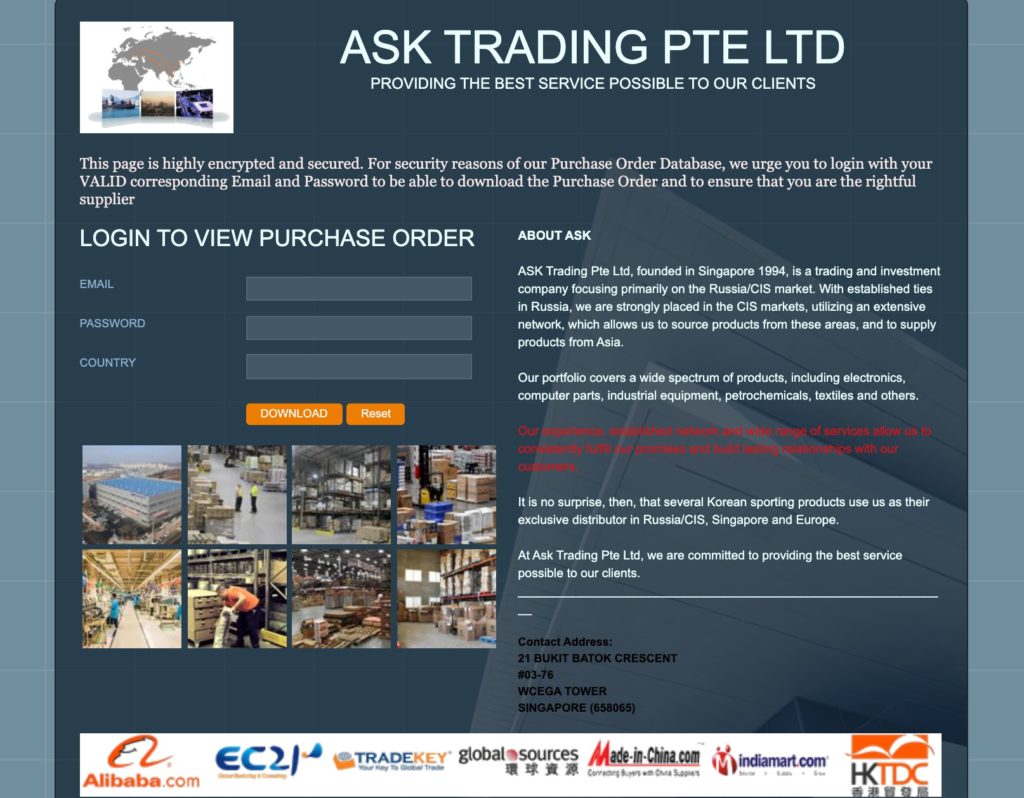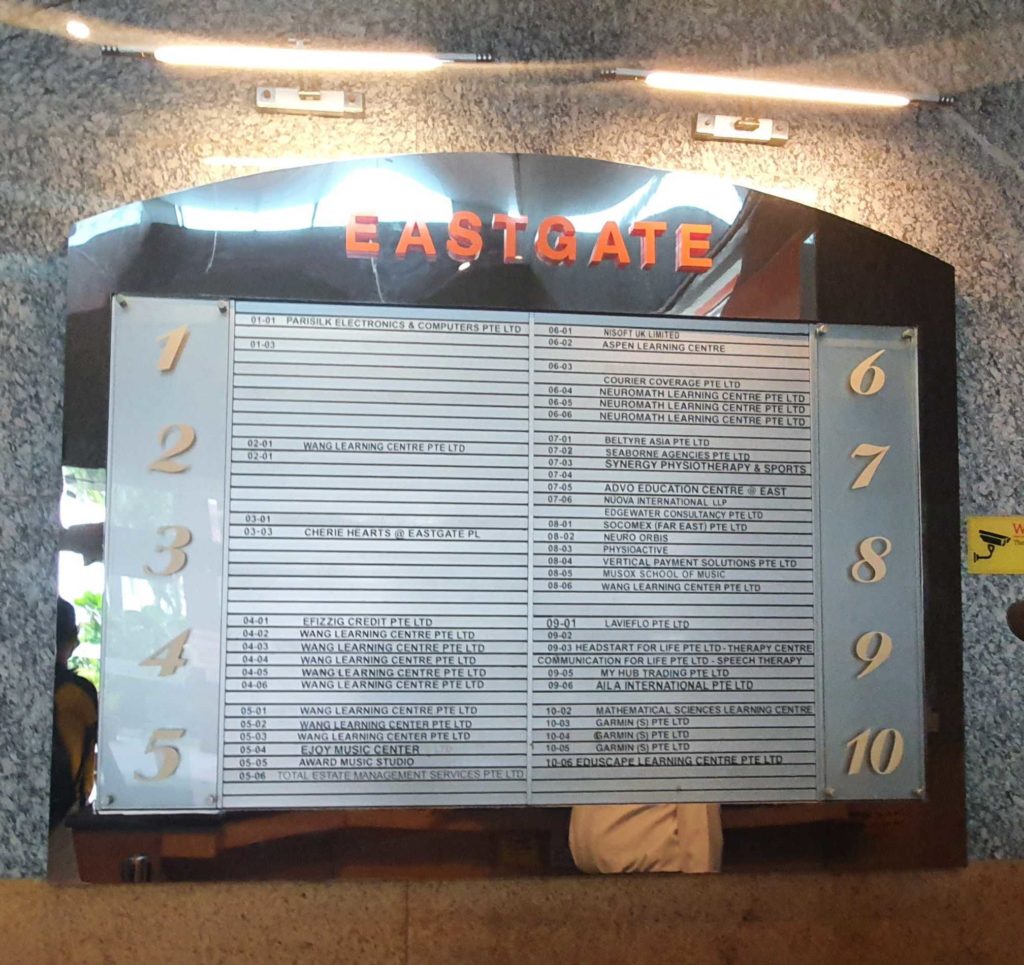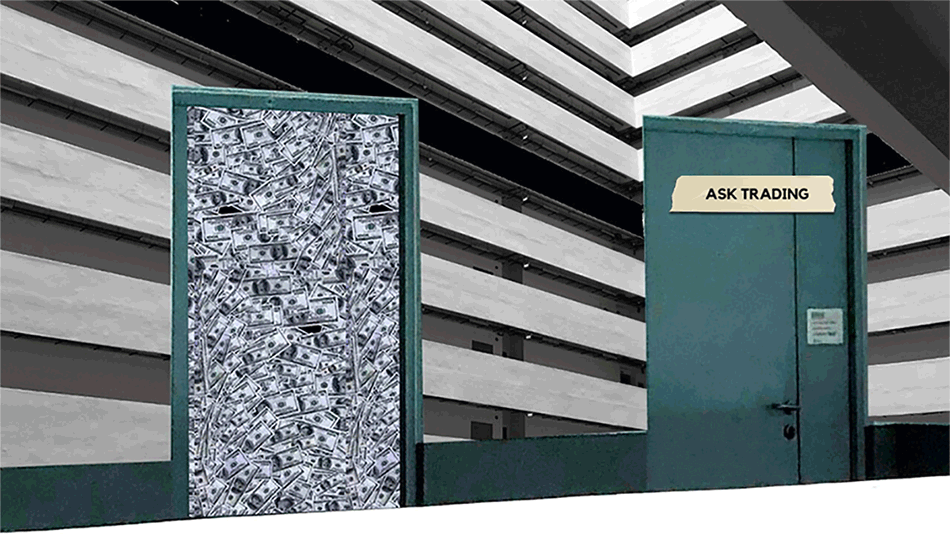For a business that bragged about selling literally anything, from petrochemicals and textiles to “Korean sporting goods,” Ask Trading ran a business in Singapore for over 20 years with no warehouses, no showrooms, and no proper office.
At one of two listed locations, security guards said no such company existed. At the other, no signs on the windowless structure advertised its presence. Strange for a company behind hundreds of millions of dollars in transactions. A buzz on the door was answered not by a random employee, but by Yeo Tiam Chye, a man name-checked one day prior in a massive expose of trillions of suspicious dollars funneled through the world’s banks.
Coconuts found that while Ask Trading disappears once you get past its stock-image filled website and an entry in a government database, it is now being formally investigated by Singaporean authorities.
A day after he was named in an expose of the company’s role in moving millions of dollars in shady money through the global finance system, Yeo denied knowing much about his company’s business, despite working there and knowing its Russian founder Maxim Glazov for 26 years – since 1994. Yeo said he was merely “lending” his name and office address to the company and had conducted data-entry services for it.
“How can I be suspicious? I have tens of clients, you see, and my staff does the data entry. I can only know if the client speaks to me and says I’m going to do this illegal act or I’m going to transact to this illegal country. For me, I don’t know,” the 60-year-old said, seemingly surprised he was named in the BuzzFeed story despite acknowledging he’d spoken to a reporter from the American news organization.
BuzzFeed’s bombshell was based on leaked documents from a U.S. financial crimes agency known as FinCEN about trillions of dollars of suspicious transactions worldwide that included at least US$671 million (S$921 million) that passed through Singapore from 2001 to 2016 – all of it by Ask Trading. BuzzFeed described it as a shell company playing “an outsize role in the dark economy.”
Reporter John Templon documented his attempts to get an explanation from Yeo, Glazov, and current resident director Heng Boon Liang about Ask Trading’s transactions and links to criminals, but all three men distanced themselves from the company or avoided answering questions, according to the report.
It said that Glazov denied knowing anything about the company’s website and asserted that he hadn’t been involved with it for a few years. Heng could not be found despite Templon visiting his home in Yishun, and Yeo did not respond to questions about Ask Trading beyond denying wrongdoing in a separate case in which he was fined for helping a client avoid taxes.
The money was moved through Bank of New York Mellon, JPMorgan Chase, and Deutsche Bank, which had previously flagged Ask Trading to FinCen, aka the Financial Enforcement Crimes Network, but did not halt its transactions. Among the transactions Templon highlighted were 50 payments by Russian company LLC Inter-Trade amounting to US$27 million for “fluorescent lights.”
Yeo declined to divulge how he knew Glazov other than to say they had been introduced back when he had an office in Rochor in downtown Singapore. He moved to the Bukit Batok office in early 2000, he said.
What of their decades of affiliation and shared links to a business moving hundreds of millions of dollars? Yeo likened it to a friend overstaying their welcome on your Netflix account.
“I do it as a favor, I don’t get any fees for using my office [address]. The whole trouble with my business is this, clients use your address so later on when you ask them ‘Eh, please, you are no longer doing business with us, don’t use my address.’ They still use [it],” Yeo said. “I have letters received from clients who are no longer, I threatened to throw them away.”
Other telltale signs of a shell appeared to be true. The company’s generic website, business profile, and lack of physical assets show it practically does not exist – at least not in the way companies dealing with sporting goods or handling millions of dollars worth of lights and construction materials would.
Ask Trading’s website states it as “a trading and investment company focusing primarily on the Russia/CIS market” that can source a wide range of products. The “highly encrypted and secured” website also required customers to log in to create a “purchase order.”

Links to criminal world, under investigation
The FinCEN data also reportedly linked invoices for construction materials to US$4 million sent to a UAE company found to be labeled a transnational criminal organization, which the U.S.Treasury Department said had laundered money for criminals such as drug traffickers.
Coconuts was unable to get in touch with either Ask Trading’s Russian founder Maxim Glazov or its current director, Heng Boon Liang.
But at its legally registered address, an insignificant 28-story office tower in Bukit Batok, the company wasn’t listed. Outside, the names of other businesses were – Adpeco Integrated Services and Financial Reporting Services. That’s where this reporter found Singaporean Yeo, who runs the two named businesses and was previously listed as Ask Trading’s director in the years after it was incorporated in 1994.
If there was ever a man that does not stand out, that man is Yeo Tiam Chye. He is of average height and on a recent day was wearing plain work pants and a collared shirt while speaking to Coconuts, looking like a regular dad no one would guess had links to criminal cash.
Yeo insisted to Coconuts that Ask Trading was his “client” and professed cluelessness to the company’s suspicious activities. Yeo’s office address was also used by another Glazov company, a startup called SafeChats which had been developing a Telegram-style messaging app with plans for encrypted transactions until – as Yeo asserted – it folded.
SafeChat’s social media accounts have been dormant since last year but are still publicly available. Once installed, the app’s interface errored out with an invalid server certificate.
Yeo also claimed that he broke ties with Glazov two years ago without going into detail, but Coconuts discovered several things that happened during that period. In 2018, public records show Ask Trading had stopped paying taxes and filed its last financial statements for the previous year. Not long after, Yeo was fined S$80,000 for helping a separate client avoid taxes by underreporting revenue.
Coconuts reached out to the relevant authorities and learned that Ask Trading is under investigation. The Commercial Affairs Department, which investigates suspicious activity reports, would not comment further on an open case.
Ask Trading is still considered active in the Accounting and Corporate Regulatory Authority’s public business registry. The company was vaguely described as dealing with the “wholesale trade of a variety of goods without a dominant product.”
A quick search online found Ask Trading was also located at the EastGate building on Upper East Coast Road. That’s where security guards said no such company existed. Inside an office on the fifth floor that also happens to offer accounting services, someone said through an intercom that they had not heard of Ask Trading.

Too easy to set up a business here
There are many versions of Ask Trading in Singapore with a public-facing local run point, and it’s usually those front people who get caught.
In August, a man named Beh Chuen Leng was busted for incorporating a company on behalf of a foreigner. His punishment? The maximum penalty – a paltry S$5,000 fine – and disqualification from serving as a company director for one year. The unnamed company was later found to be linked to money laundering, police said, but did not reveal whether any action was taken against it or those involved.
Stories like these seem so normal in Singapore that when we spoke to a lawyer with years of experience in corporate and finance cases, he did not seem surprised at all.
“It is regrettable that Singapore companies are used to facilitate money laundering, tax evasion and other illicit activities. A tough stance must and should be taken against these entities,” Ronald JJ Wong of Covenant Chambers said in an email. “It is however not surprising that there are such occurrences. Wherever there are opportunities for profit, there will be exploiters.”
In the financial hub of Singapore, setting up a business is almost too easy and doesn’t even require a physical office or actual address. Business owners can simply purchase virtual office addresses to make their businesses appear legitimate and engage a corporate service provider to handle the paperwork. That provider can use the same address for multiple companies it helps to set up, and there is nothing illegal about any of it.
Wong recognized that it’s all meant to “facilitate legitimate businesses and entrepreneurship,” and that there has to be an “appropriate balance” when performing due diligence without harming valid business. The people who help to set up such businesses may be victims themselves, he noted.
“We should realise that bad actors will go to great lengths to produce fraudulent information and evidence to achieve their ends,” he said, adding that while such service providers are duty-bound to perform due diligence on their clients, it’s possible they are “themselves defrauded by these bad actors.”
Corporate service providers are expected to report suspicious activity to the authorities, Wong said, while banks that fail to perform due diligence on clients can face fines of up to S$1 million and up for repeat offenders.
Yet banks in Singapore are rarely held accountable for dubious transactions outside the most high-profile and egregious cases. In 2017, the Monetary Authority of Singapore fined UOB and Credit Suisse S$900,000 and S$700,000, respectively, for weak oversight of transactions linked to the colossal looting of Malaysia’s 1MDB state fund. The relatively insignificant fines came after a review that took two years to complete.
As one of Singapore’s largest banks DBS said last month in regard to the billions of shady money moving through the country, stopping bad clients in their tracks is “difficult.”
Wong seemed to agree, saying: “Yet, it is difficult for a bank to verify to a high level of certainty whether a customer’s business is truly what it purported.
“If a customer is truly a bad actor, it would go to great lengths to provide fraudulent information or evidence for the purpose of [customer due diligence]. A bank’s system may not be able to pick up red flags,” he added.
Banks are also not allowed to undertake transactions for any customer they are unable to satisfactorily complete appropriate due diligence measures, he said.
In the meantime, since last month’s massive leak of suspicious activity, investigations and probes have been announced around the world, but no arrests or prosecutions are in sight.
Additional writing and reporting by Todd Ruiz, Carolyn Teo.
Other stories:
FinCEN files: It’s ‘difficult’ to halt dubious transactions, Singapore bank says
Billions in shady money moved through Singapore’s banks: report



